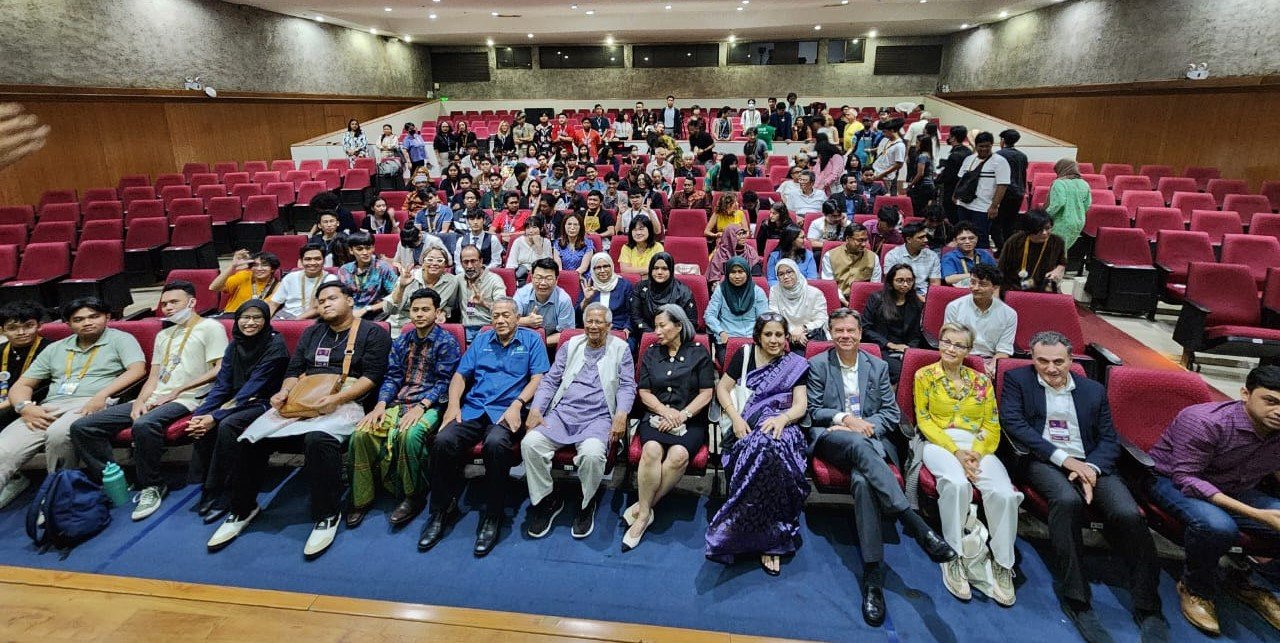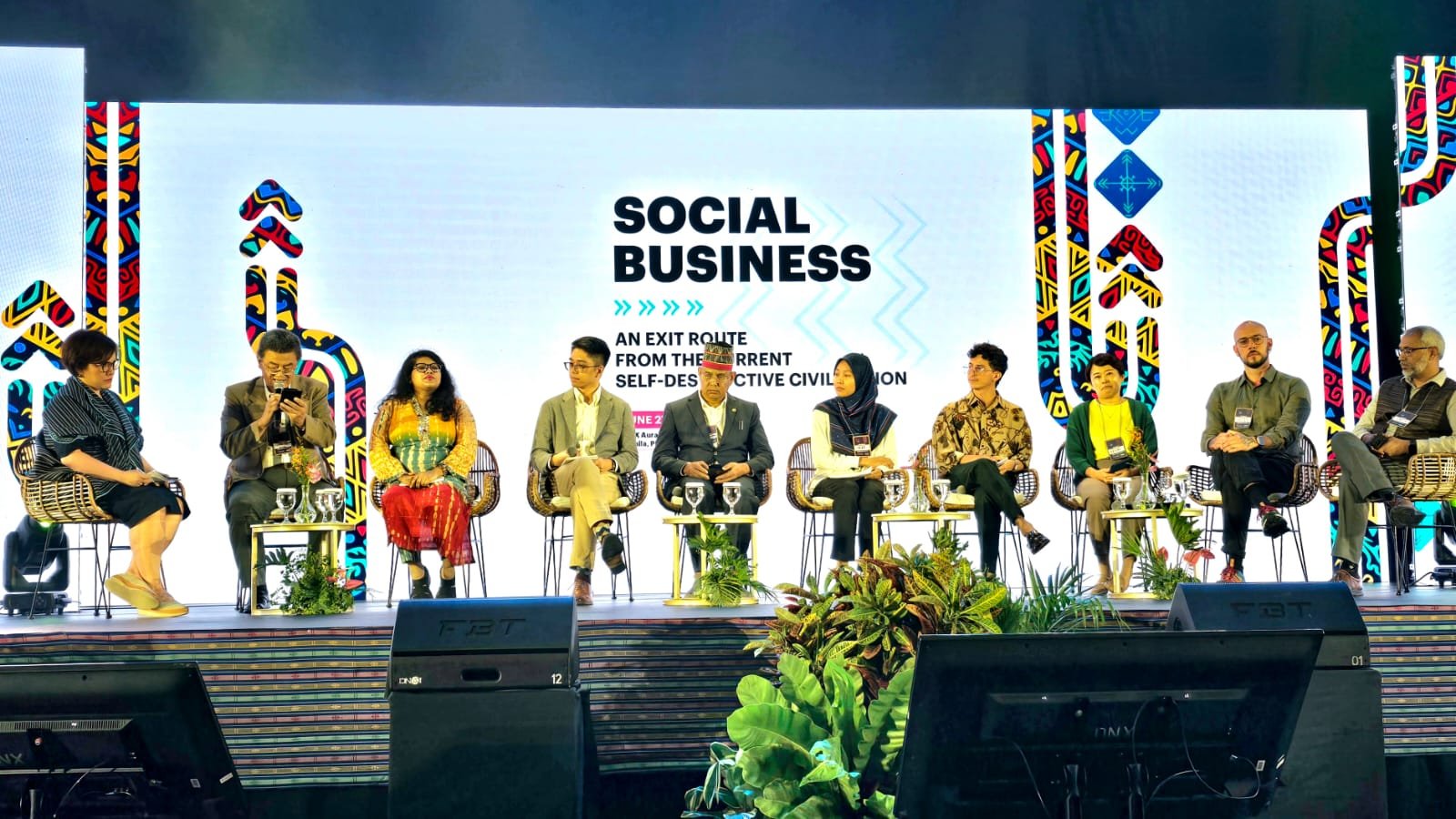SOCIAL BUSINESS
Social business is a cause-driven business. In a social business, the investors/owners can gradually recoup the money invested, but cannot take any dividend beyond that point. Purpose of the investment is purely to achieve one or more social objectives through the operation of the company, no personal gain is desired by the investors. The company must cover all costs and make profit, at the same time achieve the social objective, such as, healthcare for the poor, housing for the poor, financial services for the poor, nutrition for malnourished children, providing safe drinking water, introducing renewable energy, etc. in a business way.
The impact of the business on people or environment, rather the amount of profit made in a given period measures the success of social business. Sustainability of the company indicates that it is running as a business. The objective of the company is to achieve social goal/s.
Clarifications on Social Business
I am not opposed to making profit. Even social businesses are allowed to make profit with the condition that profit stays with the company; the owners will not take profit beyond the amount equivalent to investment. Social business is a new category of business. It does not stipulate the end of the existing type of profit-making business. It widens the market by giving a new option to consumers. It does not intend to monopolise the market and take the existing option away. It adds to the competition. It brings a new dimension to the business world, and a new feeling of social awareness among the business community.
When we approach the concept of social business from the philanthropy side, it looks very convincing and logical. Why should everything in philanthropy be given away? If some of these goals can be achieved more efficiently and sustainably in a (social) business format, then why not take that route? After all our purpose is to achieve the social goal.
But when you approach it from the orthodox business side, it tends to look a bit out of tune. Why on earth give up profit? Why should anyone run a business without profit? I understand the surprise perfectly.
Let me clarify: I am not asking any businessperson to give up any of their businesses. Nor am I asking them to convert some of their businesses into social business. The idea of "giving up" something creates this shock wave. I am not asking anybody to "give up" anything. All I am saying, if you are worrying about a social problem (while totally engaged in your routine business) I have a message for you, you can make a significant contribution in resolving the problem. If you put your mind seriously into it, you may even open the door to eliminate the problem globally. You can do both: conventional business and social business.
It is all upto you to decide whether you want to do a such thing or not. Nobody will raise an accusing finger at you if you do no such thing. But you may feel happy if you do it. I am suggesting a way which may make you a happier person
*
A Learning Process
It is a great learning process. You are doing things which you never did before. You are thinking in a way which you never did before. You are surprised to see you are enjoying it a lot. You start digging into your experiences to see what is relevant for the task. You check through the reservoir of technology that you are familiar with, start contacting the pool of experts that you have gotten to know in your business, to achieve your new goal. You start exploring a new world which was totally unknown to you. You realise that you are now wearing "social business glasses" on your eyes, you see things which you never saw before. You start sensing that your eyes were fitted with "profit-maximizing glasses" all along, while you thought these were your natural eyes in your economic world.
Now when you turn your eyes to your own profit-making businesses you start noticing things which you never noticed before. You bring new-gained experiences from your new business to your old businesses. Slowly you move towards becoming an multi-dimensional person, rather than a robot-like person.
*
Some people ask me why can't you run businesses with some profit and some social benefit "doing well by doing good", as it is popularly described.
Of course, it can be done. I am never against it. But I am trying go to the ultimate point where you don't make any profit for yourself at all. This is easy to identify, easy to handle in day to day decision making.
When you mix profit and social benefit it gets complicated for the CEO. His thinking process gets clouded. He does not see clearly. More often this CEO will take decision in favour of profit, and exaggerate the social benefit. Owners will go along with it. Social business gives a clear unambiguous mandate to the management. There is no balancing act involved. If you can agree to take a "small" profit, you can also persuade yourself to take zero profit. Once you get there you get rid of all old ways of thinking. You prepare yourself to explore a new world, a new way of seeing things, and doing things in a different way. When you were in the world of a "small profit" you were still operating in the old world, with old ways of doing things, only restraining yourself here and there.
*
Another way to put the same question is: Why can't you allow thee investors in social business to get a small fixed profit say, 1% dividend. My answer is the same. I may describe this situation by saying something like this: you are in a "no smoking" building, you are arguing "Why can't I be allowed to take just one small puff ?" Answer is simple it destroys the attitude. In Ramadan, Muslims are not allowed to eat or drink until the after the sunset. Why not take a sip of water during the day? It destroys the strength of the mental commitment. You lose a lot for a small favour.
*
Social business is about making complete sacrifice of financial reward from business. It is about total delinking from the old framework of business. It is not about accommodation of new objectives within the existing framework. Unless this total delinking from personal financial gain can be established you'll never discover the power of real social business. Some times you can set up a technically correct social business with the purpose of making profit through your other companies by selling products or services to this social business company. This will be a clear sabotage of the concept. There may be many other subtle ways by which one can weaken the concept and practice of social business. A genuine social business investor must make all efforts so that he does not walk into this trap unwittingly.
*
Capitalism has created poverty by focusing exclusively on profit. It built a fairy-tale of prosperity for all. This never happened. That's why Europe decided to entrust the government to take care of poverty, unemployment and health. They were smart enough to figure out the emptiness of capitalism in solving these problems.
Author's Summary on Creating a World Without Poverty
While free market capitalism is thriving globally, almost unopposed now, and bringing unprecedented prosperity to many, half of the world lives on two dollars a day or much less. Eradication of poverty remains the biggest challenge before the world. Colossal social problems and deprivations, mostly poverty-related and very unevenly distributed around the globe, continue to shame us everyday. Obviously the free market has failed much of the world. Many people assume that if free markets can’t solve social problems, then governments can. After all, the government is supposed to represent the interests of society as a whole. But decades and even centuries of experience has shown that while government must do its part to help alleviate our worst problems, it alone can not solve them.
Fortunately for us there is a keen desire among many to lend a hand through charity, for addressing the problems of poverty and other social problems. Charity is rooted in basic human concern for other humans. These days concern is usually expressed in the shape of non-profits and NGOs which may take various names and forms. Then there are aid organizations sponsored by rich governments' bilateral and multilateral. Nonprofits and aid organizations are trying to keep the problems within some control. But charity is a form of trickle-down economics; if the trickle stops, so does help for the needy. On the other hand multilaterals like World Bank focus only on growth as the means of helping the poor, but can not see that the poor people can be actors themselves. There are serious questions about the type of growth that can help the poor. As another response to the global social problems some businesses are identifying themselves with the movement for Corporate Social Responsibility (CSR), and are trying to do good to the people while conducting their business. But profit-making still remains their main goal, by definition. Though they like to talk about triple bottom lines of financial, social, and environmental benefits, ultimately only one bottom line calls the shot: financial profit.
I always believed that poverty can be totally conquered in our own lifetimes if the right approach is adopted. I based my belief on the inherent ability of the poor that can be unleashed once they are given the opportunity to help themselves. This I have proved in action through my three decades of experience with Grameen Bank. The concept of microcredit did not exist before I initiated Grameen Bank in Bangladesh, which basically recognized that credit without collateral is a fundamental right of the poor. Our success with this in my own country has been widely replicated all over the world including in some of the richest countries; and the Nobel Peace Prize 2006 for Grameen Bank and myself is one recognition of that success. The story of Grameen Bank has been told in my earlier book: "Banker to the Poor". In this new book I have described the further evolution of Grameen System. But more importantly I have introduced and elaborated here my broadened concept of social business, that the Grameen experience has led me into.
Grameen allowed the poor to be an actor in the free market and to enjoy some of its fruits to try to come out of poverty. It is fundamentally a business model, pure and simple, but a social business. There can be other social businesses. They are just like any other business; but for social objectives and not for personal gain or dividend. I have tried to show in the book why social business can succeed in addressing social problems where other means mentioned above have failed. social business should not be confused with the term social enterprise which is used in a more encompassing sense and includes NGOs, personal initiatives, charities, etc., and may include social business too.
Social business introduces a totally revolutionary dimension to the free market economy. It does not interfere with the mechanism through which the normal Profit Making Business (PMB) works and prospers capitalization, expert business management, competitiveness etc., but investors here do not receive any dividend, though they can recover their investment if they want to, to reinvest in other social businesses or PMBs. The satisfaction gained in achieving the stated social goals are the only motive behind the investment, and the business will be evaluated according to that standard. Essentially it is a non-loss, non-dividend business aimed at social objectives education, health, environment, whatever is needed to address the problems faced by society. The profits here remain with the business and help it to grow further. The whole thing is based on the premise that entrepreneurs need not be motivated only by the profits they personally receive, but can also be motivated by social goals and may enjoy success there with equal satisfaction. The important thing is not to mix up a Social Business with a PMB. In fact the inclusion of Social businesses alongside PMBs in the business world will give the free market capitalism a larger, nobler and a more fulfilling purpose. Its advantages over straightforward charity are many efficiencies, continuous use with each turnover, competition with PMBs following the same rules, utilization of business innovations being some of the most important ones.
There can be two types of social business. Type One focuses on businesses dealing with social objectives only, as has just been mentioned. Type Two can take up any profitable business so long as it is owned by the poor and the disadvantaged, who can gain through receiving direct dividends or by some indirect benefits. There are various ways how the ownership can go to the poor. The two types can be mixed together in the same social business as has happened in the case of Grameen Bank. In a similar mixture of the two types, a socially beneficial rural toll road or bridge can be built by a company as a social business whose ownership will belong to the poor. On the other hand a huge project such as the Deep-Sea Mega Port in Bangladesh, which I have been advocating for, which will be used by several countries in the whole region and can potentially change the economic face of Bangladesh, can be built as a social business owned by the poor women of the country.
Is this an utopia? Will there be social businesses outside the realm of microcredit? Who will invest in such social businesses? I could answer these questions confidently in my new book, not only because I have faith in my idea and on the ability of the entrepreneurs to have social motives as well as profit making motives; but also because I am seeing this actually to happen at this very moment. I have devoted a good part of the book on the details of the first such social business we have started Grameen Danone Company which went into operation in early 2007. The idea of the company was born over just a casual lunch I had with Franck Riboud, the Chairman and CEO of Groupe Danone, a large French corporation a world leader in diary products. It took just that time for me to convince him that an investment in a social business is a worthwhile thing for Danone shareholders. Even though it will not give any personal dividend to them, he agreed to the proposition even before I fully explained it to him. It took somewhat more time to fix up the modalities, the product (a fortified sweet yogurt for the poor malnourished children of Bangladesh at a price they can afford), the financing, tax and regulatory issues, new yard sticks for evaluating business and many other such details. And I have devoted many pages of the book on these details to show how all these things can be taken care of. The yogurt "Shokti Doi" (Energy Yogurt) is already in the market.
The Grameen System has invested in a second social business this time an Eye Hospital where the poor can have eye treatment and cataract operations at a very low cost and all others in the small town and the villages around will have an excellent medical facility where there was not any like that before.
Social business is a new concept and its practice is just beginning. As my book reveals, it has to make a lot more exploration while gaining more experience. There are challenges to be faced and solutions to be developed. For example, we had to invent a totally innovative marketing system to keep the market fragmented so that the low cost "Shokti Doi" is reserved only for the poor children and does not disappear in the urban market for the well to do. I have also touched upon other issues such as how can the ownership of the Type Two social business be transferred to the poor, or how can the wonderful opportunities offered by IT be best deployed for social business.
One thing is very clear to me that with social business taking off, the world of free market capitalism will never be the same again, and it then will really be able to deliver a deathblow on global poverty. I am sure, many business wizards and successful business personalities will apply their abilities to this new challenge the challenge of creating a poverty-free world within a short time. At the moment we are seeing merely the line of horizon. Soon a good part of business genius, creativity and innovation of the world will devote itself to this new goal of social good. A whole new stock market with its new indices will thrive in the financial capitals of the world motivated by this new incentive. It will accelerate the process of poverty eradication to an unthinkable pace using the same market mechanism which accelerated the global prosperity for the rich in the first place.
Welcome to the new world of social business.
Muhammad Yunus
25 December 2007
Types of Social Businesses
Type I: focuses on businesses dealing with social objectives only.
Eg. The product produced is for the benefit of the poor.
Type II: can take up any profitable business so long as it is owned by the poor and the disadvantaged, who can gain through receiving direct dividends or by some indirect benefits.
Eg. The product could be produced by the poor but exported to an international market while net profits would go towards workers benefits.
Wikipedia: Social Business
Related
15th Social Business Day 2025 to be held on June 27–28
Statement from Professor Muhammad Yunus:
দেশবাসীর উদ্দেশ্যে প্রফেসর ইউনূসের বক্তব্য
Prof. Muhammad Yunus felicitated in Manila on the occasion of his 40th anniversary of receiving the “Ramon Magsaysay” Award.

“র্যামন ম্যাগসাইসাই” পুরস্কার প্রাপ্তির ৪০তম বার্ষিকী উপলক্ষে প্রফেসর মুহাম্মদ ইউনূসকে ম্যানিলায় সম্মাননা প্রদান

Social Business Academia Dialogue & 3ZERO Club Convention 2024 held in Manila, Philippines

The 14th Social Business Day concludes in Manila, Philippines

The 14th Social Business Day 2024 kicks off in Manila, Philippines



